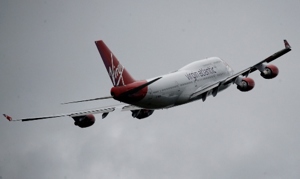Virgin Atlantic wins UK permit for 100% SAF TransAtlantic flight
(Reuters) - Virgin Atlantic will fly from London to New York on Nov. 28 using 100% SAF, after Britain gave it permission, paving the way for a world first as airlines step up efforts to decarbonize travel.
Airlines are pinning their hopes on SAF, which uses waste such as cooking oils to reduce emissions by up to 70% compared to fossil fuels, to decarbonize flying before new electric and hydrogen-powered options expected in the coming decades.
SAF is currently used to power jet engines but only as part of a blend with traditional kerosene.
Britain's Civil Aviation Authority on Monday granted Virgin Atlantic a permit for a transatlantic flight powered only by SAF to showcase how the fuel can be used to decarbonize flying.
The permit was awarded following a number of technical reviews by the UK regulator, including successful ground testing of running the Rolls-Royce Trent 1000 engine that powers Virgin's 787 aircraft.
Virgin must now seek permission from regulators in the United States, Ireland and Canada for the flight.
SAF accounted for only 0.5% of aviation fuel in 2021, but many airlines have a target of 10% by 2030 and the industry's goal of "net zero" emissions by 2050 relies on SAF accounting for 65% of fuel.
Virgin said it hoped the flight would highlight the need the challenge to make SAF more readily available. Currently SAF is only made in small volumes and costs between three to five times as much as regular jet fuel.
"We're committed to using 10% SAF by 2030, but to get there we need the government to support the creation of a UK SAF industry," Virgin Atlantic CEO Shai Weiss said in a statement.







Comments